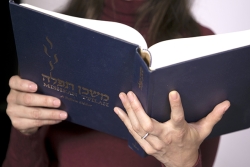Why do we celebrate Tu BiShvat, the Jewish “New Year of the Trees,” in the middle of winter?
Tu BiShvat, called the "New Year of the Trees," falls at a seemingly incongruous time of year.
What is the correct term for people who adhere to Reform Judaism: "Reformed Jews," "Reform Jews," or "reformed Jews"?
Thanks for asking! The correct term is “Reform Jews.” Reform Judaism teaches that change is ongoing; the reforming of Jewish tradition and practice is not something that concluded in the past, but rather is something that continues with each individual. Therefore, “Reform” in the present tense is the appropriate term.
Can you recommend a Jewish prayer book for someone who is exploring Judaism? There are so many from which to choose.
Mishkan T'filah, the Reform Movement’s newest siddur, includes Hebrew with both transliteration and English translations, as well as beautiful prayers in English.
Is it appropriate to visit a grave on Passover?
According to Jewish custom, it is preferable to visit graves before a holiday, so that on the day of the holiday, we can focus attention on observing or celebrating.
On the Other Hand: Ten Minutes of Torah - Yitro: Humility and Advice
In this weekly podcast, we will offer insight into the weekly Torah portion, condensing 2,000 years of Jewish wisdom into just 10 minutes of modern-day commentary. This week Rabbi Rick Jacobs delves deep into parashat Yitro from the book of Exodus. Enjoy!
Three ways to listen:
On the Other Hand: Ten Minutes of Torah - Mishpatim
In this weekly podcast, we will offer insight into the weekly Torah portion, condensing 2,000 years of Jewish wisdom into just 10 minutes of modern-day commentary. This week Rabbi Rick Jacobs delves deep into parashat Mishpatim from the book of Exodus. Enjoy!
Four ways to listen:
On the Other Hand: Ten Minutes of Torah - Vayigash: Putting Judah in Judaism
Do you ever wonder why Judaism is called Judaism? This week’s parashah, Vayigash, has an answer. This is the moment when Joseph and his brothers, including Judah, dramatically reconnect, and Judah demonstrates a deep caring for his people.
On the Other Hand: Ten Minutes of Torah - Mikeitz: Fighting Darkness with Light
Even though the miracle of the oil wasn’t an original part of the Hanukkah story, it has become one of the most enduring narratives in modern Judaism.
On the Other Hand: Ten Minutes of Torah - Vayishlach: Healing a Negative Relationship
Have you ever dreaded seeing a friend or family member that you don’t get along with, only to end up having a positive experience? After twenty years away from home, Jacob dreads his reunion with Esau, but our text teaches the two end up embracing and healing their tumultuous relationship.
On the Other Hand: Ten Minutes of Torah - Vayeitzei: Our Spiritual Ascents
Rabbi Israel Salanter wrote that it’s easier to learn the entire Talmud than to change one character trait in ourselves. Even Jacob, when he dreams of the ladder that connects heaven and Earth, is still on his path of growth and awakening.



